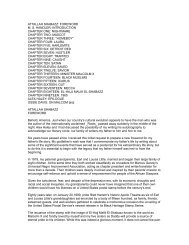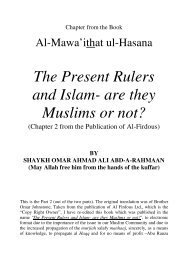Create successful ePaper yourself
Turn your PDF publications into a flip-book with our unique Google optimized e-Paper software.
An interesting point is brought up in <strong>the</strong> careers of both<br />
Nicolai and Mendelssohn, as well as with Knigge who was<br />
also tied in with Nicolai and Mendelssohn. 38 Apparently <strong>the</strong>se<br />
kindred Spirits harbored revolutionary thoughts long before<br />
<strong>the</strong>re was an organization for <strong>the</strong>m <strong>to</strong> implement <strong>the</strong>se<br />
thoughts in<strong>to</strong> action. The llluminati provided not only <strong>the</strong><br />
organizational structure for action, but also a milieu for <strong>the</strong>se<br />
people <strong>to</strong> engage in an organized conspiracy, for we know that<br />
when kindred spirits unite under <strong>the</strong> name of an organization,<br />
evils that an individual may just contemplate can be put in<strong>to</strong><br />
action, and that groups will not hesitate <strong>to</strong> effectuate what a<br />
single individual has hesitations about.<br />
Peretz Smolensken (1842-1885), <strong>the</strong> great Hebraist, was<br />
acute enough <strong>to</strong> perceive that <strong>the</strong>re was some kind of<br />
connection between Mendelssohn and <strong>the</strong> Reform movement.<br />
Smolensken was a staunch critic of Reform Judaism and <strong>the</strong><br />
Haskala. David Philipson (1862), who was one of <strong>the</strong> leaders<br />
of <strong>the</strong> American Reform movement, did not quote Smolensken<br />
by name, but in his book The Reform Movement in Judaism,<br />
he takes <strong>to</strong> task those who frequently spoke of Mendelssohn<br />
as an origina<strong>to</strong>r of <strong>the</strong> Reform movement. While it appears<br />
that Philipson knew of <strong>the</strong> connection between <strong>the</strong> Bund der<br />
Gerechten and <strong>the</strong> Reformers, apparently he knew nothing<br />
about <strong>the</strong> llluminati influence or connection with Reform, so he<br />
cannot see <strong>the</strong> continuum of Mendelssohn <strong>to</strong> Reform. He thus<br />
says that Mendelssohn made <strong>the</strong> Reform movement possible<br />
"by giving <strong>the</strong> impulse <strong>to</strong> modern education among Jews, but a<br />
religious reformer he was not." 39<br />
Philipson goes on <strong>to</strong> say,<br />
"Quite <strong>the</strong> contrary. He conformed strictly <strong>to</strong> every requirement<br />
and demand of Rabbinical Judaism. His conception of<br />
Judaism was that it is a Divine legislation; that since <strong>the</strong><br />
ceremonial law was revealed by God, it has potency and must<br />
be observed until it shall be repealed by ano<strong>the</strong>r revelation."<br />
64




